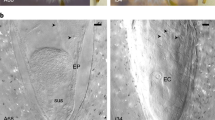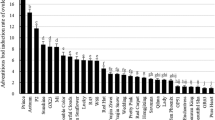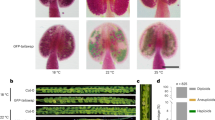Abstract
HAPLOID plants have been found in many species, but, so far as I am aware, there has been no recorded instance of haploid pollen mother cells occurring in a diploid plant. Bridges1 has found patches of haploid tissue in Drosophila.
This is a preview of subscription content, access via your institution
Access options
Subscribe to this journal
Receive 51 print issues and online access
$199.00 per year
only $3.90 per issue
Buy this article
- Purchase on Springer Link
- Instant access to full article PDF
Prices may be subject to local taxes which are calculated during checkout
Similar content being viewed by others
References
Bridges, Science, 72, 405 (1930).
Gaines and Aase, Amer. J. Bot., 13, 6, 373 (1926).
Yamazaki, Japan. J. Genet., 11, 314 (1935); Abst. in Der Zuchter, 8, 161 (1936).
Hollingshead, Cytologia, 3, 1, 119 (1932).
Author information
Authors and Affiliations
Rights and permissions
About this article
Cite this article
LOVE, R. Occurrence of Haploid Pollen Mother Cells in a vulgare Wheat. Nature 138, 589–590 (1936). https://doi.org/10.1038/138589b0
Issue Date:
DOI: https://doi.org/10.1038/138589b0
This article is cited by
-
Cytological investigation of Triticale
Theoretical and Applied Genetics (1971)
-
Untersuchungen zum Problem der Herabregulierung der Chromosomenzahl in experimentell erzeugten polypliden Pflanzen
Zeitschrift f�r Vererbungslehre (1958)
-
Cytology of cereals. II
The Botanical Review (1946)
-
The nature of tetraploidy inPrimula kewensis
Journal of Genetics (1939)
Comments
By submitting a comment you agree to abide by our Terms and Community Guidelines. If you find something abusive or that does not comply with our terms or guidelines please flag it as inappropriate.



